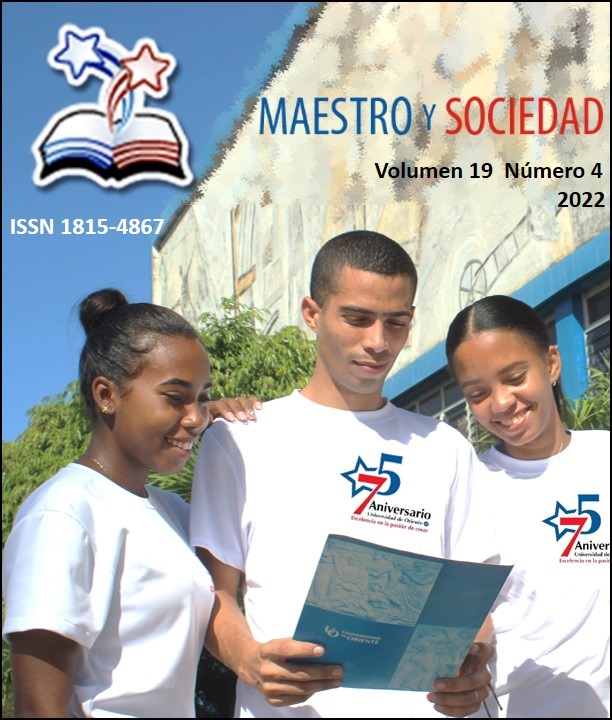Teaching material for the development of communicative competence in the pre-graduate training of the primary teacher
Teaching material for the development of communicative competence in the pre-graduate training of the primary teacher
Keywords:
communicative competence; inclusive education, Special educational needsAbstract
The objective of this work is to propose a teaching support material for teachers and primary teachers in undergraduate training as part of the actions that must be carried out in the different subjects of the curriculum with an emphasis on the Linguistic and Literary Studies discipline, which enables the communicative competence of these and their subsequent contribution to the development of an inclusive education in primary school students. It starts as a fundamental premise, from the communicative competence that the primary teacher must develop in the undergraduate from the classroom context towards the achievement of knowledge and educational influences that guarantee a quality education, where each primary teacher in training can reveal this communicative competence from the undergraduate degree to later contribute to the development of an inclusive education in the exercise of their profession. Methods such as document and bibliographic analysis, observation.
References
Cala, M. E. (2020). Una aproximación a las vivencias en universitarios con discapacidad visual de la Facultad de Psicología de la Universidad de la Habana. [Tesis de licenciatura. Universidad de La Habana].
Cejudo, J., Díaz, M., Losada, L. & Pérez, J. (2016). Necesidades de formación de maestros de infantily primaria en atención a la diversidad. Bordon Revista pedagógica, 20. file:///C:/Users/Usuario/Downloads/DialnetNecesidadesDeFormacionDeMaestrosDeInfantilYPrimari-5546259.pdf
Cornejo, C. (2017). Respuesta educativa en la atención a diversidad desde la perspectiva de profesionales de apoyo. Revista colombiana de educación, 77-96. http://www.scielo.org.co/pdf/rcde/n73/0120-3916-rcde-73-00077.pdf
Echeita, G. (2017). Educación inclusiva. Sonrisas y lágrimas. Aula Abierta, 46, 17-24. https://doi.org/10.17811/rifie.46.2017.17-24
Symeonidou, S. (2017). Initial teacher education for inclusion: A review of the literature. Disability & Society, 32(3), 401-422. https://doi.org/10.1080/09687599.2017.1298992 1966.
González, Y. & Triana, D. (2018). Actitudes de los docentes frente a la inclusión de estudiantes con Moscoso, S. (2018). Logros. Educación para la Ciudadanía. Holguín Ediciones.
Jiménez, F. y Montecinos, C. (2018). Diversidad, modelos de gestión y formación inicial docente: Desafíos formativos desde una perspectiva de justicia social. Revista Brasileira de Educação, 23, 1-21.
Morocho García, M. (2021). Las competencias comunicativas de los docentes para la atención a la diversidad. [Tesis de Maestría. Universidad Laica Vicente Rocafuerte de Guayaquil].
Moya, & Martínez, E. (2017). El aula inclusiva, condiciones didácticas y organizativas. https://revistaeducacioninclusiva.es/index.php/REI/article/view/100/97
Pantic, N. y Carr, D. (2017). Educating teachers as agents of social justice: A virtue ethical perspective. En Florian, L. y Pantíc, N. (Eds.). Teacher education for the changing demographics of schooling. Issues for research and practice. (pp. 55-66). Springer Nature. https://doi.org/10.1007/978-3-319-54389-5_5
Roméu, E. A. (2003). El enfoque cognitivo, comunicativo y de orientación sociocultural. Dimensiones e indicadores de la competencia cognitiva, comunicativa, sociocultural. Colección Pedagogía 2007.
Roméu, E. A. (2003). Aplicación del enfoque comunicativo en la escuela media en Taller de la palabra. Editorial Pueblo y Educación.
Symeonidou, S. (2017). Initial teacher education for inclusion: A review of the literature. Disability & Society, 32(3), 401-422. https://doi.org/10.1080/09687599.2017.1298992.
Unesco. (2008). Temario abierto sobre educación inclusiva. Materiales de apoyo para responsables de políticas educativas. Unesco.
Published
How to Cite
Issue
Section
License
Copyright (c) 2022 Yudmila González-González, Adia Gell-Labañino, Ángel Bravo-Rodríguez

This work is licensed under a Creative Commons Attribution-NonCommercial-NoDerivatives 4.0 International License.
This journal provides immediate open access to its content, based on the principle that offering the public free access to research helps a greater global exchange of knowledge. Each author is responsible for the content of each of their articles.


























 Universidad de Oriente
Universidad de Oriente 